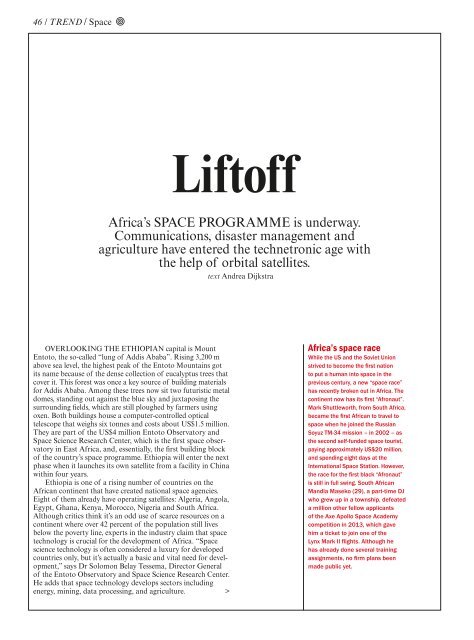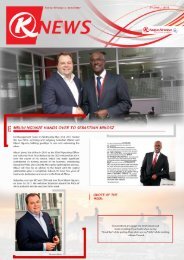Create successful ePaper yourself
Turn your PDF publications into a flip-book with our unique Google optimized e-Paper software.
46 / TREND / Space<br />
TREND / 47<br />
Liftoff<br />
Africa’s SPACE PROGRAMME is underway.<br />
Communications, disaster management and<br />
agriculture have entered the technetronic age with<br />
the help of orbital satellites.<br />
text Andrea Dijkstra<br />
OVERLOOKING THE ETHIOPIAN capital is Mount<br />
Entoto, the so-called “lung of Addis Ababa”. Rising 3,200 m<br />
above sea level, the highest peak of the Entoto Mountains got<br />
its name because of the dense collection of eucalyptus trees that<br />
cover it. This forest was once a key source of building materials<br />
for Addis Ababa. Among these trees now sit two futuristic metal<br />
domes, standing out against the blue sky and juxtaposing the<br />
surrounding fields, which are still ploughed by farmers using<br />
oxen. Both buildings house a computer-controlled optical<br />
telescope that weighs six tonnes and costs about US$1.5 million.<br />
They are part of the US$4 million Entoto Observatory and<br />
Space Science Research Center, which is the first space observatory<br />
in East Africa, and, essentially, the first building block<br />
of the country’s space programme. Ethiopia will enter the next<br />
phase when it launches its own satellite from a facility in China<br />
within four years.<br />
Ethiopia is one of a rising number of countries on the<br />
African continent that have created national space agencies.<br />
Eight of them already have operating satellites: Algeria, Angola,<br />
Egypt, Ghana, Kenya, Morocco, Nigeria and South Africa.<br />
Although critics think it’s an odd use of scarce resources on a<br />
continent where over 42 percent of the population still lives<br />
below the poverty line, experts in the industry claim that space<br />
technology is crucial for the development of Africa. “Space<br />
science technology is often considered a luxury for developed<br />
countries only, but it’s actually a basic and vital need for development,”<br />
says Dr Solomon Belay Tessema, Director General<br />
of the Entoto Observatory and Space Science Research Center.<br />
He adds that space technology develops sectors including<br />
energy, mining, data processing, and agriculture.<br />
><br />
Africa’s space race<br />
While the US and the Soviet Union<br />
strived to become the first nation<br />
to put a human into space in the<br />
previous century, a new “space race”<br />
has recently broken out in Africa. The<br />
continent now has its first “Afronaut”.<br />
Mark Shuttleworth, from South Africa,<br />
became the first African to travel to<br />
space when he joined the Russian<br />
Soyuz TM-34 mission – in 2002 – as<br />
the second self-funded space tourist,<br />
paying approximately US$20 million,<br />
and spending eight days at the<br />
International Space Station. However,<br />
the race for the first black “Afronaut”<br />
is still in full swing. South African<br />
Mandla Maseko (29), a part-time DJ<br />
who grew up in a township, defeated<br />
a million other fellow applicants<br />
of the Axe Apollo Space Academy<br />
competition in 2013, which gave<br />
him a ticket to join one of the<br />
Lynx Mark II flights. Although he<br />
has already done several training<br />
assignments, no firm plans been<br />
made public yet.<br />
Getty Images
















